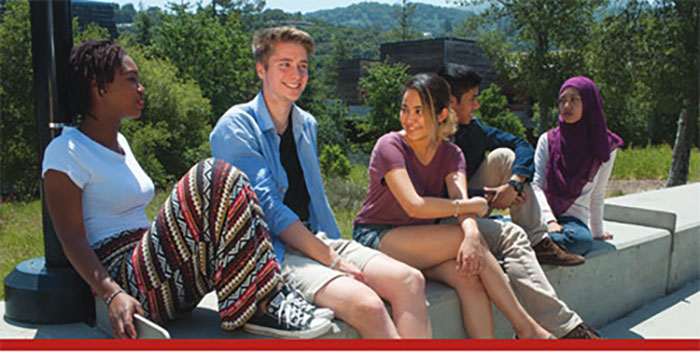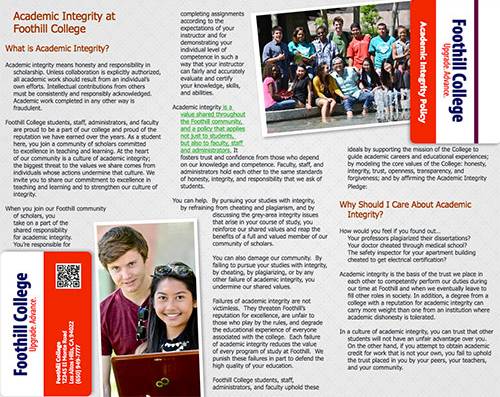
Student Handbook
Academic Integrity Preface
The two most common kinds of academic dishonesty are cheating and plagiarism.
- Cheating is the act of obtaining or attempting to obtain credit for academic work through the use of dishonest, deceptive or fraudulent means.
- Plagiarism is representing the work of someone else as your own and submitting it for any purpose.
For Students
It is every student’s responsibility to know what constitutes academic dishonesty. If you have any questions, ask your instructor, division dean or the Dean of Student Affairs & Activities.
Academic Integrity Honor Code at Foothill College
What is Academic Integrity?
Academic integrity means honesty and responsibility in scholarship. Unless collaboration is explicitly authorized, all academic work should result from an individual's own efforts. Intellectual contributions from others must be consistently and responsibly acknowledged. Academic work completed in any other way is fraudulent.
Foothill College students, staff, administrators, and faculty are proud to be a part of our college and proud of the reputation we have earned over the years. As a student here, you join a community of scholars committed to excellence in teaching and learning. At the heart of our community is a culture of academic integrity; the biggest threat to the values we share comes from individuals whose actions undermine that culture. We invite you to share our commitment to excellence in teaching and learning and to strengthen our culture of integrity.
Shared Responsibility
When you join our Foothill community of scholars, you take on a part of the shared responsibility for academic integrity. You're responsible for completing assignments according to the expectations of your instructor and for demonstrating your individual level of competence in such a way that your instructor can fairly and accurately evaluate and certify your knowledge, skills, and abilities.
Academic integrity is a value shared throughout the Foothill community and a policy that applies not just to students, but also to faculty, staff, and administrators. It fosters trust and confidence from those who depend on our knowledge and competence. Faculty, staff, and administrators hold each other to the same standards of honesty, integrity, and responsibility that we ask of students.
You can help. By pursuing your studies with integrity, by refraining from cheating and plagiarism, and by discussing the grey-area integrity issues that arise in your course of study, you reinforce our shared values and reap the benefits of being a full and valued member of our community of scholars.
You can also damage our community. By failing to pursue your studies with integrity, by cheating, by plagiarizing, or by any other failure of academic integrity, you undermine our shared values.
Failures of academic integrity are not victimless. They threaten Foothill's reputation for excellence, are unfair to those who play by the rules, and degrade the educational experience of everyone associated with the college. Each failure of academic integrity reduces the value of every program of study at Foothill. We punish these failures in part to defend the high quality of your education.
Foothill College students, staff, administrators, and faculty uphold these ideals by supporting the mission of the College to guide academic careers and educational experiences; by modeling the core values of the College: honesty, integrity, trust, openness, transparency, and forgiveness; and by affirming the Academic Integrity Pledge:
The Foothill College Academic Integrity Pledge
I pledge to support the mission of Foothill College and to demonstrate its core values by upholding academic integrity in all my activities associated with the college.
Q. Why Should I Care About Academic Integrity?
- Your professors plagiarized their dissertations?
- Your doctor cheated through medical school?
- The safety inspector for your apartment building cheated to get electrical certification?
In a culture of academic integrity, you can trust that other students will not have an unfair advantage over you. On the other hand, if you attempt to obtain academic credit for work that is not your own, you fail to uphold the trust placed in you by your peers, your teachers, and your community.
Q.What is a Failure of Academic Integrity?
The two most common failures of academic integrity are cheating and plagiarism.
Cheating is obtaining or attempting to obtain credit for academic work through dishonesty, deception, or fraud. Here are some examples of cheating.
- Copying from someone else's test.
- Submitting work presented previously in another course, if contrary to the rules of either course.
- Altering or interfering with grading.
- Using or consulting, during an examination, unauthorized sources, devices, or materials; and
- Committing any act that defrauds or misrepresents the provenance of an academic work.
- Incorporating the ideas, words, sentences, paragraphs, or parts of another person's writings, without giving appropriate credit, and representing the product as your own;
- Representing another's artistic or scholarly works such as musical compositions, computer programs, photographs, paintings, drawings or sculptures as your own;
- Submitting a paper written by someone else; and
- Using web sources without documentation.
- Enabling cheating by allowing another student to copy from your paper during a test;
- Enabling plagiarism by giving your academic work to another student;
- Allowing another person to submit your work in their name;
- Impersonating another student;
- Lying to an instructor or college official;
- Altering a graded work after it has been returned, then submitting the work for re-grading;
- Stealing tests;
- Changing anyone's final grade;
- Forging signatures on college documents; and
- Collaboration on academic work that is not authorized by the instructor.
Q. What are the Consequences of a Failure of Academic Integrity
The Student Affairs & Activities Office maintains records of students whose actions have constituted a failure of academic integrity. We use this information to identify and discipline students whose actions fail to uphold our shared value of academic integrity.
Acknowledgments
We thank the Student Affairs Vice President's Office at San Jose State University,
the University Library at the University of Illinois at Champaign-Urbana, the Academic
Integrity Office at the University of California - San Diego, the University of San
Francisco, and the Academic Integrity Seminar for materials incorporated in this code.
The Foothill College Academic Senate developed and approved this Academic Honor Code
in 2004. The Academic Senate collaborated with the Associated Students of Foothill
College, the Foothill College Classified Senate, and the Foothill Student Affairs
and Activities Office for this 2013 update.
Report Academic Dishonesty and/or Disruptive Behavior |

Questions?
We're Here to Help!
Catalina Rodriguez, Acting Dean of Students
650.949.7241
Campus Center, Building 2000, Room 2002
Academic Integrity at Foothill College
|


